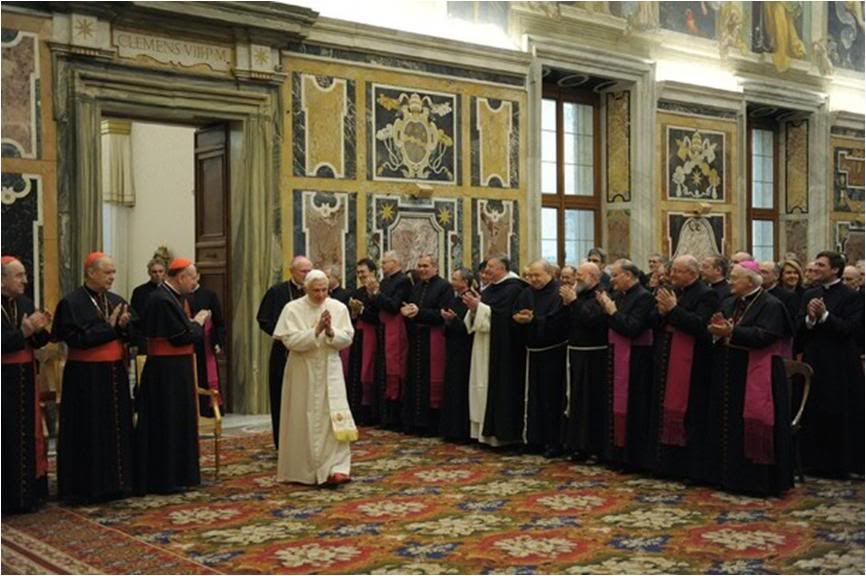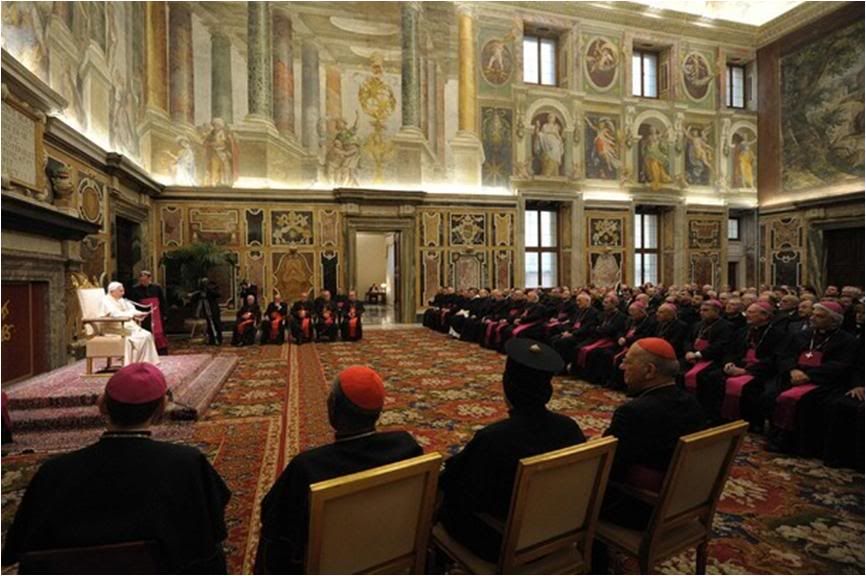| | | OFFLINE | | Post: 19.124
Post: 1.770 | Registrato il: 28/08/2005
Registrato il: 20/01/2009 | Administratore | Utente Veteran | |
|
 Intelligence and balance in
Intelligence and balance in
seeking proof of saintliness
Translated from
the 12/20/09 issue of

In the 40 years since it was created, the Congregation for the Causes of Saints has imposed a more organic and modern form on the activity of discernment by the Church in recognizing saintliness.


Pope Benedict XVI pointed this out in addressing the members of the Congregation whom he received at the Sala Clementina Saturday morning on the occasion of their 40th anniversary.
Here is a translation of the Pope's address, given in Italian:
Dear brothers and sisters,
I wish to express to all my joy at this meeting. I greet all the cardinals, archbishops and bishops present, with a special thought for the Prefect of your dicastery, Archbishop Angelo Amato, whom I thank for the kind and affectionate words which he spoke in your behalf.
With him, I greet the Secretary of the Congregation, the Undersecretary, priests, religious, historical consultants and theologians, postulators, lay officials, medical experts, along with your families and co-workers.
2, The special circumstance that gathers you together around the Successor of Peter is the celebration of the 40th anniversary of the institution of the Congregation, which has conferred a more organic and modern form on the activity of discernment that the Church has used from the beginning to recognize the saintliness of so many of her children.
The creation of your dicastery was prepared by the interventions of my predecessors, especially Sixtus V, Urban VIII and Benedict XVI, and was realized in 1969 by the Servant of God Paul VI. Thanks to them, a complex of experience, scientific contributions and procedural norms has been continually configured into an intelligent and balanced synthesis that led to the creation of a new dicastery.
I am well acquainted with the activity which, in these past four decades, the Congregation has carried out, with competence, in the service of edifying the People of God, offering a significant contribution to the work of evangelization.
Indeed, when the Church venerates a saint, it announces the efficacy of the Gospel and uncovers with joy the presence of Christ in the world, believed and adored in the faith, and capable of transforming the life of man in order to produce fruits of salvation for all mankind.
Moreover, every beatification and canonization is, for Christians, a strong encouragement to live with intensity and enthusiasm the following of Christ, journeying towards the fullness of Christian existence and the perfection of charity (cfr Lumen gentium, 40).
In this light, one understands the role of the dicastery in accompanying every single stage of an event of such singular profundity and beauty, faithfully documenting the manifestation of that sensum fidelium that is an important factor for recognizing saintliness.
3. The saints, sign of that radical novelty that the Son of God, with his incarnation, death and resurrection, has instilled in human nature, and distinguished witnesses to the faith, are not representatives of the past, but constitute the present and the future of the Church and of society.
They have fully realized the caritas in veritate which is the supreme value of Christian existence, and are like the facets of a prism which, with different nuances, reflect the one light who is Christ.
The lives of these extraordinary figures of believers, belonging to all the regions of the earth, present two significant constants that I wish to underscore.
Above all, their relationship with the Lord, even when following traditional ways, is never stale or repetitive, but is always expressed in authentic, vivid and original modalities, which come from an intense and engrossing dialog with the Lord that enhances and enriches even external forms.
Moreover, in the lives of these our brothers and sisters, what stands out is the continuous search for evangelical perfection, the rejection of mediocrity and the impulse towards total belonging to Christ.
"Be holy, for I, the LORD your God, am holy" (Lev 19,2) is the exhortation in Leviticus which God addressed to Moses. It makes us understand that holiness is striving constantly towards the high standard of Christian life, a demanding conquest and continuous quest for communion with God, which makes the committed believer 'correspond' with the maximum generosity possible to the plan of love that the Father has for him and for all mankind.
4. The principal stages of recognizing saintliness on the part of the Church - namely, beatification and canonization - are united by a link of great consistency. To them must be added, as the indispensable preparatory phase, the declaration of heroic virtues or martyrdom of a Servant of God, and ascertainment of an extraordinary gift, the miracle, that the Lord grants through the intercession of his faithful servant.
How much pedagogical wisdom is manifested in such an itinerary! In the first place, the People of God are invited to look at these brothers and sisters who, after careful discernment, are proposed as models of Christian life. Then, the faithful are exhorted to address them with veneration and invocation circumscribed by the jurisdiction of the local Church or religious order [to whom the candidate belongs]. finally, they are called on to exult with the entire community of believers in the certainty that, thanks to a solemn pontifical proclamation, a son or daughter of the Church has reached the glory of God, where he or she will take part in a perennial intercesion to Christ in favor of their brothers and sisters (cfr Heb 7,25).
In this journey, the Church welcomes with joy and wonder the miracles that God, in his infinite goodness, freely gives her in order to confirm the evangelical preaching (cfr Mk 16,20). It also welcomes the testimony of martyrs as the most limpid and intense form of configuration with Christ.
This progressive manifestation of saintliness corresponds to the style chosen by God in revealing himself to man, and at the same time, it is part of the journey through which the People of God grows in faith and in knowledge of the Truth.
The gradual nearing to the 'fullness of light' emerges singularly in the passage from beatification to canonization. In this progress, in fact, events of great religious and cultural vitality take place, in which liturgical invocation, popular devotion, imitation of virtues, historical and theological study, attention to the 'signs from on high' are interwoven and enrich each other reciprocally.
In this circumstance, a promise of Jesus to disciples through all time is realized: "The Spirit of truth... will guide you to all truth" (cfr. Jn 16, 13).
The testimony of the saints, in fact, brings to light and makes us learn ever new aspects of the evangelical message.
As well underscored by the words of the Prefect, in the itinerary for recognition of sainthood, there emerges a spiritual and pastoral richness which involves the entire Christian community.
Saintliness - which is the transformation of persons and human realities to the image of the resurrected Christ, represents the ultimate purpose of the plan of divine salvation, as the Apostle Paul reminds us: "This the will of God: your sanctification" 1 Thess 4,3).
5. Dear brothers and sisters, the Solemnity of the Nativity, for which we are preparing, brings to full splendor the dignity of every man who is called to become a child of God. In the experience of the saints, this dignity is realized in the concreteness of historical circumstances, of personal temperaments, of free and responsible choices, of supernatural charisms.
Comforted by such a great number of witnesses, let us hasten our own steps towards the Lord who comes, raising the splendid invocation that culminates the hymn of Te Deum: "Aeterna fac cum sanctis tuis in gloria numerari" - in your glorious coming, welcome us, O Word incarnate, to the assembly of your saints.
With such a hope, I gladly wish each one fervent wishes for the imminent Nativity celebrations, and affectionately impart the Apostolic Blessing.
[Modificato da TERESA BENEDETTA 20/12/2009 06:00] |